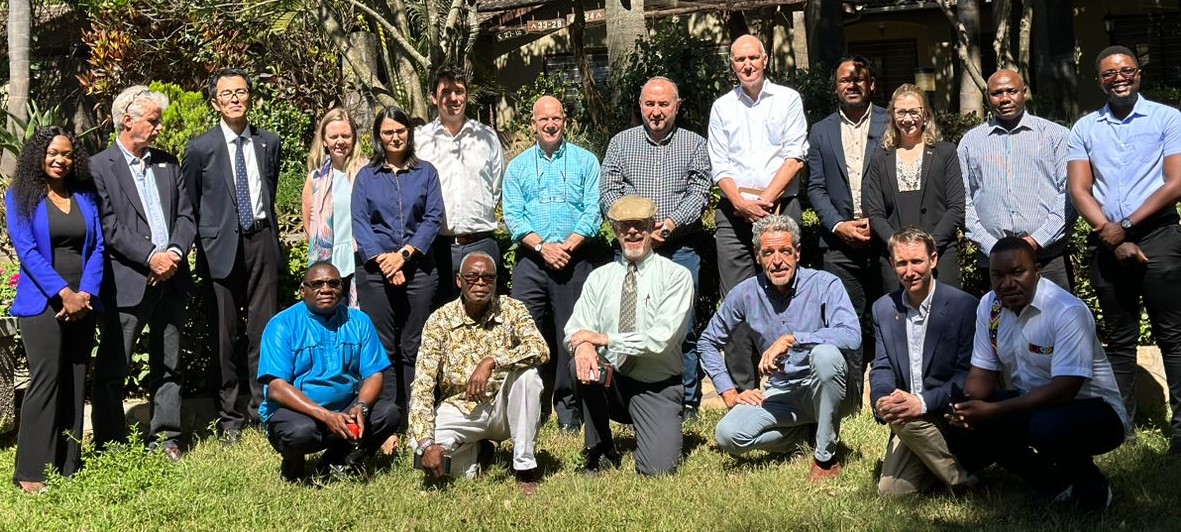On 9 June 2023, DCAFS members held their traditional annual retreat as a strategic event to reflect on the preceding year’s achievements, reviewing lessons learnt and setting up priorities for the joint work in the year ahead. The group engaged in very critical and constructive discussions on how to strengthen internal coordination and harmonization; and become more influential in the policy dialogue with the Government.
The retreat brought together representatives from the European Union, the World Bank, USAID, FCDO, Flanders Government, Norwegian Embassy, AfDB, Japanese Embassy, IFAD, IFPRI, FAO and WFP.
The retreat witnessed the departure of the long-serving DCAFS member as well as outgoing Chair, Beatrice Neri of the EU. In her farewell remarks, Beatrice Neri applauded DCAFS agency members for being one of the more active and strategic donor groups enhancing coherence in support as well as influence in policy reforms in agriculture, thus achieving better value for money from donor contributions.
On the joint review of the 2022/23 collective achievements, the DCAFS confirmed the following:- Had consistent monthly rhythm meetings with good attendance, precise agenda and informative discussion including direct participation of strategic institutions such as MoA, MBS, PDU and DoDMA.
- Had regular thematic meetings on Land Governance and AIP reform for in-depth discussions to inform technical and political level discussions contributing to the ongoing policy reforms.
- Had a joint field visit that allowed the DPs to appreciate strong ownership and adoption of traditional soil health and water conservation technologies by the resource-poor farmers bringing viable alternatives to the AIP programme in view of the visible economic returns from the adoption of these practices.
- Successfully engaged the Principal Secretary (PS) of the Ministry of Agriculture through five direct meetings with the DCAFS Troika, and ahigh-level meeting chaired by the EU Ambassador and the Minister of Agriculture on the occasion of the annual Joint Sector Review, where the Minister was invited to re-think the AIP in order to invest in key drivers for growth such as irrigation, rural infrastructure, research and agricultural services.
- Strengthen exchange of information between DCAFS donors and the Department of Planning at the MoA with regards to the financing of projects implemented by CSO and NGO in Malawi which is an important database to inform prioritisation of public support.
- Ensure that DCAFS priorities are aligned with the Ministry’s priorities, and these include Mega farms development; AIP reform, including Climate Smart Agriculture and irrigation development; Agriculture Commercialization; and Land reform and Laws (2022 amendment).
- Ensure DCAFS members inform their respective implementing partners from the projects they finance, on progress made in policy discussions with government to improve business environment and public resource allocations, so that they can play a strategic advocacy role to mobilize the civil society at their level.
- Ensure bringing a holistic approach to DCAFS analysis and action involving various interlocutors and the broader business environment affecting the farmers and private sector investment.
- Improve DCAFS engagement with Ministry of Trade and Industry (MoTI) and the Ministry of Finance, Economic Planning and Development (MoF) as they are key in supporting the agriculture commercialisation agenda.
- Accelerate the transition of the database of DCAFS supported projects from the Agriculture National Investment Plan (NAIP) to the Malawi 2063 Implementation Plan 1 (MIP-1), so that information is readily available for the next round of reporting.
- Increase harmonization of donor support to agriculture, for which the DCAFS Secretariat will lead arrangements for conducting bilateral meetings with DCAFS donors and their implementing partners in order to update and complete the database of projects supporting agriculture. Detailed information will be captured in order to identify gaps and overlaps, as well as opportunities for complementarity.
